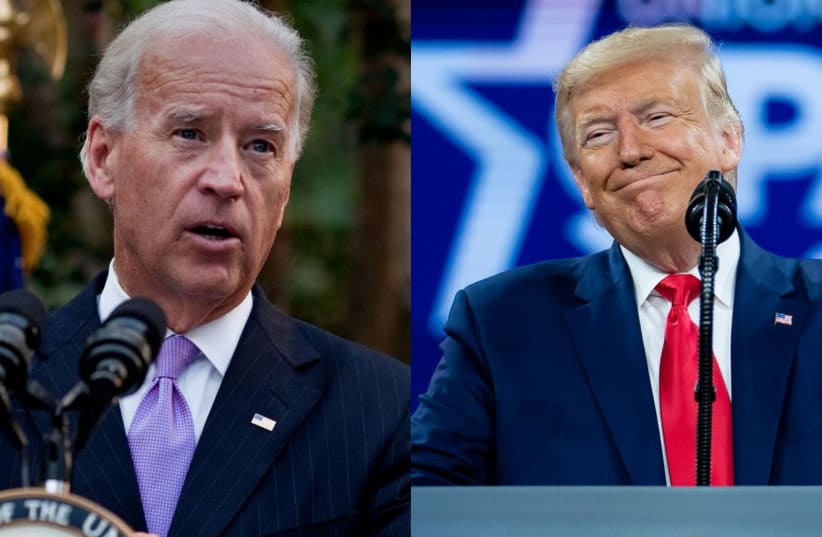President Joe Biden and former President Donald Trump both clinched their parties' nomination on Tuesday, kicking off the first US presidential election rematch in nearly 70 years.
Biden needed 1,968 delegates to win the nomination, Edison Research said. On Tuesday night, he passed that number as results began to come in from the primary contest in Georgia. Results were also coming in from Mississippi, Washington state, the Northern Mariana Islands, and Democrats living abroad.
Hours later, Trump clinched the 1,215 delegates required to secure the Republican presidential nomination as four states held contests, including Georgia, the battleground where Trump faces criminal charges for his efforts to overturn the state's 2020 results. There were 161 delegates at stake on Tuesday in Georgia, Hawaii, Mississippi and Washington state.
Biden, 81, issued a statement after he sealed the Democratic nomination, taking aim at what he called Trump's "campaign of resentment, revenge, and retribution that threatens the very idea of America."
"Voters now have a choice to make about the future of this country. Are we going to stand up and defend our democracy or let others tear it down? Will we restore the right to choose and protect our freedoms or let extremists take them away?" he said.
The outcome of Tuesday's voting was essentially predetermined after Trump's last remaining rival for the Republican nomination, former UN Ambassador Nikki Haley, ended her presidential campaign following Trump's dominant performance last week on Super Tuesday when he won 14 of 15 state contests.

In a video posted on social media, Trump said there was no time to celebrate and instead put the focus on beating Biden, whom he called the "worst" president in US history.
"We're going to drill, baby, drill. We're going to close our borders. We're going to do things like nobody has ever seen before. And we're going to make our nation's economy be the best ever in the world," said Trump.
Biden, meanwhile, faced only token opposition in the Democratic primary campaign, though liberal activists frustrated by his support for Israel's war in Gaza have convinced a sizable minority of Democrats to vote "uncommitted" in protest.
Both men have already turned their attention to the Nov. 5 general election, holding dueling rallies in Georgia on Saturday.
In Rome, Georgia, Trump, 77, again repeated his false claim that the 2020 election was fraudulent and accused the Fulton County attorney, Fani Willis, of prosecuting him for political reasons. He also attacked Biden for failing to stem the flow of migrants at the US southern border, an issue he intends to keep front and center throughout the campaign, as he did in 2020.
The Biden campaign launched a more aggressive phase on Friday, announcing Biden would tour several battleground states amid a $30 million ad buy. The campaign said it raised $10 million in the 24 hours after Biden's State of the Union speech, adding to Democrats' financial edge over Republicans.
Voters at a crossroads
The last repeat presidential matchup took place in 1956, when Republican President Dwight Eisenhower defeated former Illinois Governor Adlai Stevenson, a Democrat, for the second time.
This year, voters have expressed little enthusiasm for a repeat of the bitter 2020 election, with Reuters/Ipsos public polls showing both Biden and Trump are unpopular with the majority of voters.
Trump's myriad criminal charges - he faces 91 felony counts across four separate indictments - could harm his standing among the suburban, well-educated voters whose support he has historically struggled to garner.
He is scheduled to become the first former American president to go on trial in a criminal case on March 25 in New York, where he faces charges he falsified business records to hide hush money payments to a porn star.
The most serious case against him is generally thought to be the federal indictment in Washington, D.C., accusing him of plotting to reverse the 2020 election. But the case is on hold after the US Supreme Court agreed to hear Trump's claim of presidential immunity, and it is unclear whether a trial can take place before Election Day.
Biden has been dogged by the perception among a majority of voters that he is too old to serve a second four-year term, though allies believe his fiery State of the Union address may serve to counter that notion.
The ongoing crisis at the US-Mexico border, where an influx of migrants has overwhelmed the system, is another weakness for Biden. He has sought to transfer the blame to Trump after the former president urged congressional Republicans to kill a bipartisan border security bill that would have stepped up enforcement.
The economy, as always, will be a central campaign issue.
Biden has presided over an expanding economy, with inflationary pressure easing and stocks hitting all-time highs. But polls show Americans unwilling to credit the president and frustrated about high prices of items like food in the wake of the pandemic.
